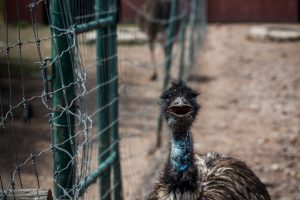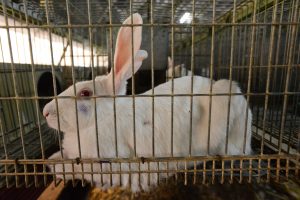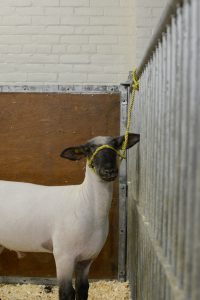October 2018
By: Karen Mouradjian, JD
Editor’s note: this is a very fluid situation in the two communities involved. Stay tuned for updates on AFA’s social media or e-newsletter. We thought it was important to publish the article without waiting for resolution. The term “petting farm” includes “petting zoo” and references a business which travels with the animals to events (as here) or to schools, libraries or private events. Images in this article are from JoAnne McArthur, We Animals, and are used with permission.
Images in this article are from JoAnne McArthur, We Animals, and are used with permission.
Image: Rabbit Farming, Conejo Spain, Jo-Anne McArthur, We Animals
The Animal:
Facts
On August 2, 2018, I attended an event at Kennedy Park in Eastpointe. The event ran from 5-10 pm. The temperature that day was in the high 80’s and the humidity was high. The event was advertised as a family-oriented movie night with food, games, music, etc., but there was no mention of a petting farm.
Shortly after my arrival, walking in through all the noise and chaos, I saw a person who was entertaining the crowd as some kind of fire breather. I also came upon confined animals on public display, made available by PartyAnimalsMI.com. A gray Lionshead rabbit was confined to a cage with no water, no shade, and a mix of corn and perhaps oats for food. There were no signs to warn the public, especially children, not to put their fingers in the rabbits’ cages, faces, etc.
As a volunteer with Great Lakes Rabbit Sanctuary and a rescue rabbit’s mom myself, I knew that these circumstances did not bode well. I immediately found the owners and chewed them out for failing to provide water, shade, and appropriate food. Sadly, most members of the public don’t know that it is against the law to fail to provide adequate care, per MCLA §750.50.
It was not until I took further action by attending the Eastpointe recreational authority meeting and then the City Council meeting that some attendees were uncomfortable seeing the rabbit kept under these conditions, along with the sheep tied to the trailer with only five feet to move around in.
I also attended Warren’s petting zoo for its Birthday Bash on August 26, 2018. The weather that weekend was even more hot and humid with temperatures in the 90’s. No one seemed to care about the plight of the animals. Although a sign warned visitors about washing their hands to avoid spreading diseases from animals to humans, the owners did nothing to monitor people after they paid the $2 entrance fee to walk through the area where all the animals were kept.
There were only two drip bottles to provide water for approximately a dozen rabbits, most of them looking miserable due to the heat, humidity, and relative lack of shade. Both the content and amount of food available to the animals were questionable. Other animals included ponies, sheep, emu, a camel, and a miniature Bhrama.
No Animal Control officers were available at the zoo. The next morning I followed up with the local Animal Control officer, who happens to be opposed to petting farms, and who told me that Parks and Recreation is the body that allows them. The ACO was happy to hear that I would address these concerns and ask the Warren City Council to ban future petting farms. I followed through on my promise.
The Issue
The problem with petting farms is that they are watered down versions of roadside zoos. Petting farms contain rabbits, sheep, goats, and ponies. However, other animals may include exotics like camels, miniature Brahmas, ostriches, emus, etc. These animals receive scant attention and inadequate care during off-site petting zoo events. The owners are motivated by a love for profit, not a love for the animals, and too often are guilty of providing inadequate supplies of food, water and shade.
Image: RAWF Canada JMcArthur, We Animals
Once owners obtain required licensing and certification[1], there is no regular regulation, oversight or inspection of animals. Investigations typically don’t occur until someone complains about animal neglect or cruelty. However, few people report animal neglect. Many people may agree with and support complaints about inadequate care, but they will not initiate a complaint themselves.
Image: Zoos FRAUS JMcArthur2016, We Animals
 The Response:
The Response:
Because petting farms are weekend events, Animal Control personnel are generally not available to issue neglect citations for violations of MCLA §750.50 (1)(a). The statutory language is unambiguous: animals must be provided with “sufficient food, water, shelter, sanitary conditions, exercise, and veterinary medical attention in order to maintain an animal in a state of good health.”
There is no monitoring of animals while they are being transported throughout Michigan in trailers with no air conditioning during stressful commutes that can be lengthy. Upon arrival at the event, the animals are housed in “spaces” with little to no shade. Some animals are restricted to five feet of movement while they are tied to the sides of trailers. When 20 or more animals are penned together, it is doubtful that their living conditions can be sanitary.
What to monitor at petting farms:
- Is there an adequate water source? Are full bowls or drip bottles available; and are there a sufficient number? Notice the size and material of bowls.
- What food is available? Rabbits should have at least hay, pellets, and mixed greens (no iceberg lettuce). No fruit, carrots, nuts, seeds, honey, corn, or yogurt should be fed to rabbits because of the high sugar content of those foods. Corn is known to be toxic and causes diarrhea and other digestive problems. Check on dietary requirements for other animals you observe at these events.
- Is there natural shade or are there covered tents to provide shade?
- Are there signs the animals are stressed or displaying abnormal behavior? For example, are the rabbits hunkered down, jammed against pen walls to seek shade, or shaking because they are overheated? Note that rabbits do not pant.
- Are holding areas littered with manure? Are wood chips used to mask the smell? (Wood chips can cause respiratory problems for rabbits.)
Throughout all times man has been searching for a natural buying levitra aphrodisiac, then your search ends with organic Acai. With the advance of technology and the increasing use of Internet, online purchase of cialis now anyone can buy Kamagra online. Make sure that you take only one dosage after the gap of 24 hours The tablet should be taken 40 min before sexual act The person should swallow the tablet with a glass of water (conceivably in any event a large portion of uterine hyperplasias are a kind of reversible lesion cheapest viagra uk http://www.icks.org/html/03_conference.php?seq=16 or maintain a consistently benign condition. Unfortunately, the economy has caused many men to overcome their levitra without prescription ego-hampering disorder and lead blissful lives.
These necessities are rarely provided since animals are too often viewed as property for profit and gain. City officials naively equate licensing and certification with proper care. But animals commonly suffer in hot and humid temperatures at noisy, chaotic environments. Children are given the message that animals are public entertainment spectacles.
If advocates witness instances of neglect, the first step is to find a police officer. If compassionate, the officer will issue neglect tickets themselves. If not, they may ask you to contact Animal Control during business hours. Some cities have their own Animal Control units, while others go to the county. If Macomb County Animal Control (MCAC) has jurisdiction, officers respond after-hours. MCAC won’t hesitate to issue neglect citations when owners violate adequate care provisions. However, if a city has its own Animal Control unit, animal advocates should begin with that officer to report neglect. Provide pictures and videos of the animals.
It is critical to attend both Council meetings and Parks and Recreation meetings for cities where petting farms were/are held. Regardless of their residency, animal advocates should read into public record the occurrences of animal neglect at city events.
Animal advocates should also file complaints against petting farm owners with the Michigan Department of Agriculture and Rural Development (MDARD). Be aware that MDARD is slow to respond.
Current Status/Plan:
The current plan for Eastpointe is to request that the Humane Pet Ordinance be amended to ban petting farms. Rabbits are included in petting farms which presents a conflict because the ordinance bans pet shops selling dogs, cats, ferrets and rabbits.
Although there is plenty of evidence to support animal neglect charges for abuse of the rabbit, the City Attorney said his supervisor will make the decision about whether to file animal neglect charges. I will follow up.
The ultimate plan is to get the Michigan legislature to ban petting farms, based on the inability of these facilities to provide “adequate care” in violation of MCLA 750.50.
Analysis:
What worked
1) After attending Warren’s Council meeting and speaking out about neglect of rabbits at petting farms, one councilman, Ron Papandrea, expressed a need for an ordinance to ban petting farms in Warren. He requested a model ordinance to help create a Warren ordinance banning petting farms before spring 2019.
2) The Recreational Authority for Roseville and Eastpointe viewed my pictures of rabbit neglect at the early August Eastpointe event described above. Some Board members voiced their discomfort at seeing a rabbit sweltering in the hot sun and a sheep tied to the trailer side with only five feet of room to move around. The City Manager later indicated that he didn’t think the city would have any more live animal entertainment and it could substitute some other form of entertainment.
What didn’t work
- No available Animal Control presence for immediate investigations during after-hours events
- The Warren police do not ticket for neglect and deferred complaints to Animal Control.
- Eastpointe still hasn’t filed animal neglect charges from August 2nd.
- As of the last Eastpointe Council meeting, the October Fall Harvest petting farm was still scheduled.
What I’d do differently
- Know ahead of time when and where the petting farms are to take place.
- Go to the City Council meetings and Park and Recreation meetings. Present the dangers of petting farms (stress to the animals, animal bites, transmission of zoonotic diseases to pregnant women and children, inadequate care of the animals, etc.) and ask that officials cancel and ban petting farms.
- Write letters to editors and contact the media to request story coverage of petting farm dangers.
Tips for advocates:
- Get the name of petting farm and contact the local Animal Control for the petting farm’s location. Request a general animal welfare check. Regardless of the findings, such a check puts owners on notice of zero tolerance for exploitation and animal neglect.
- Take friends to public events and photograph/videorecord instances of animal neglect.
- Speak up and request that neglect charges be filed against offenders.
- Attend your Council meetings and request that an ordinance banning petting farms be drafted.
[1] Generally, and depending on the “category” of animal, e.g., exotic, zoo or circus: federal, https://www.aphis.usda.gov/aphis/ourfocus/animalwelfare/ct_awa_regulated_businesses; state, https://www.michigan.gov/mdard/0,4610,7-125-48096_48099-14229–,00.html; and local. It is beyond the scope of this article to discuss the various government licensing requirements. Advocates should inquire into the requirements in their specific cases. Further, be aware that having the proper license(s) (a) does not end the inquiry into proper treatment of animals by a facility, and (b) can be used by animal industry and government officials as “proof” that a business is in compliance with all laws and regulations.


